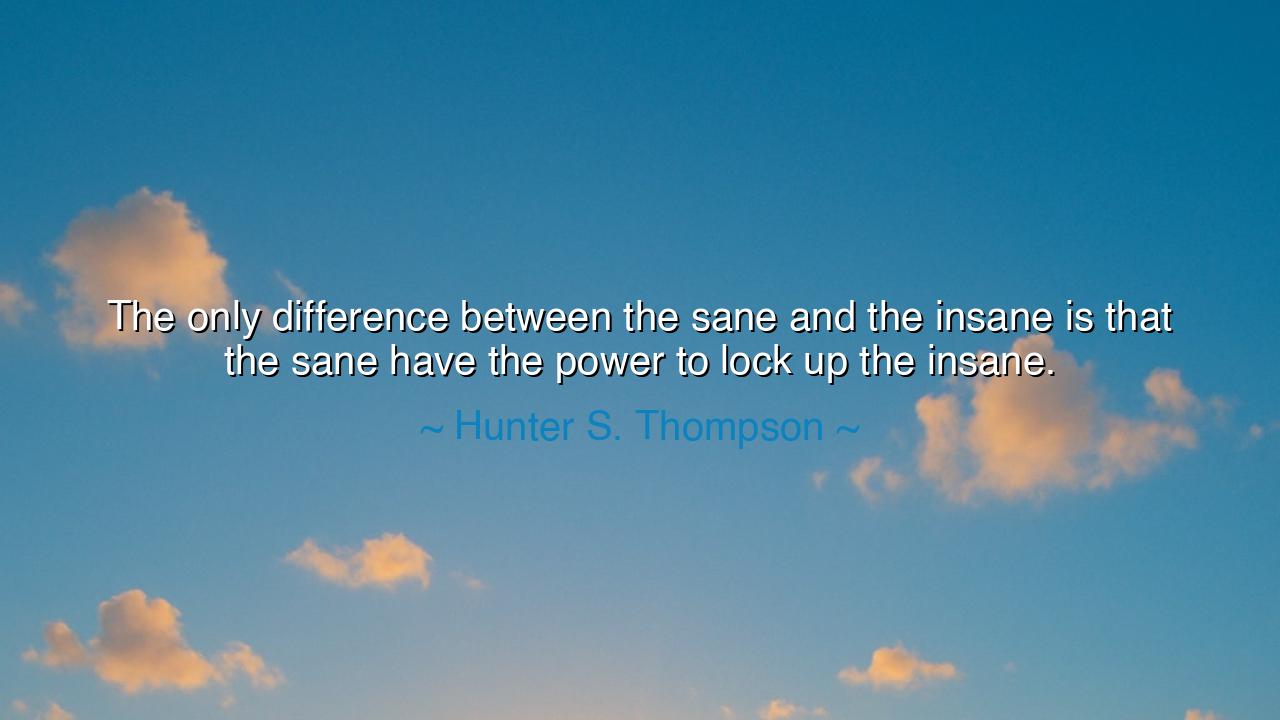
The only difference between the sane and the insane is that the
The only difference between the sane and the insane is that the sane have the power to lock up the insane.






Hunter S. Thompson, prophet of rebellion and scourge of hypocrisy, spoke with brutal candor: “The only difference between the sane and the insane is that the sane have the power to lock up the insane.” In these words lies a thunderclap of truth, unsettling yet undeniable. For what we call sanity is not always the measure of truth or clarity, but often the decree of those who hold power. The insane may speak visions too wild for the common mind, but it is the strong, the organized, the sanctioned who decide who is locked away and who is free.
The meaning cuts deep into the heart of society’s judgments. Sanity and insanity are not merely conditions of the mind but categories shaped by law, custom, and authority. Those deemed “sane” write the rules, build the prisons, and pass the judgments. The “insane,” lacking power, are silenced, confined, or erased. Thompson, ever the cynic and truth-teller, unmasks the fragility of these labels: what if the world itself is mad, and only those outside its games see clearly?
History bears witness to this paradox. Consider Joan of Arc, who claimed visions of saints and led France to victory. To her enemies, she was insane, a heretic, a danger to order; thus they locked her in chains and burned her at the stake. Yet history crowned her not mad but saint, her so-called insanity revealed as courage and divine inspiration. Here the line between sanity and madness was not truth, but the power of those who judged her.
This truth also warns of the arrogance of societies. In the Soviet Union, dissidents who spoke against tyranny were often branded insane and confined to psychiatric hospitals. Their crime was not madness but clarity, a refusal to accept lies. Yet the “sane,” holding the apparatus of the state, locked them away. Thompson’s words echo here: the difference between sane and insane was not reality but the power to enforce a definition.
Therefore, let the seeker of wisdom walk humbly. Do not rush to label others as mad, for the boundary is not eternal but fragile, shaped by fear and force. The true measure of sanity is not in the decree of courts or rulers, but in the fruits of a life—whether it creates justice, love, and harmony, or whether it destroys. Thompson’s dark wisdom reminds us that power often disguises itself as reason, and that the true madness may dwell not in the locked ward, but in the world outside.






PTTran Thi Phuong Trinh
This line makes me think about how close sanity and insanity might actually be. Maybe it’s not a fixed state but a spectrum we all move across. If so, then the power to judge others as insane is a kind of illusion of superiority. What if the so-called sane are just better at hiding their chaos? Thompson’s words seem to suggest that control, not clarity, is what truly separates one from the other.
BCA B C
I think there’s something darkly ironic here. The ability to ‘lock up’ others for being different becomes a measure of power, not morality. It makes me question whether institutional psychiatry, at least historically, served as a tool of control more than compassion. How often have labels like ‘insane’ been used to silence dissenting voices? Thompson’s observation feels less about mental illness and more about the dangerous arrogance of defining what’s normal.
BP11_1 Huynh Tran Ba Phuc
This idea hits hard because it blurs the boundary between rationality and madness. It makes me wonder—are some forms of insanity actually just radical honesty or freedom from social norms? Maybe what we call sanity is just collective conformity, and insanity is individuality taken too far. Thompson seems to challenge us to consider whether society punishes people not for being dangerous, but for thinking differently or refusing to obey.
HQHoang Hoa Quynh
I can’t help but feel a mix of cynicism and truth in this statement. It exposes how society uses authority to enforce its own version of sanity. If the sane have power, does that mean ‘sanity’ is simply the majority’s opinion? It’s unsettling to think that someone’s freedom could depend more on perception than reality. I’d love to hear how this quote relates to Thompson’s own struggles with rebellion and nonconformity.
TTThuongg Thu
This quote really makes me question how we define sanity in the first place. If the distinction is based on who holds institutional power, then it’s less about mental health and more about social control. Who gets to decide what’s 'normal'? Throughout history, people labeled as insane were often just nonconformists or visionaries. Maybe Thompson was pointing out how fragile and arbitrary that line between sanity and madness truly is.